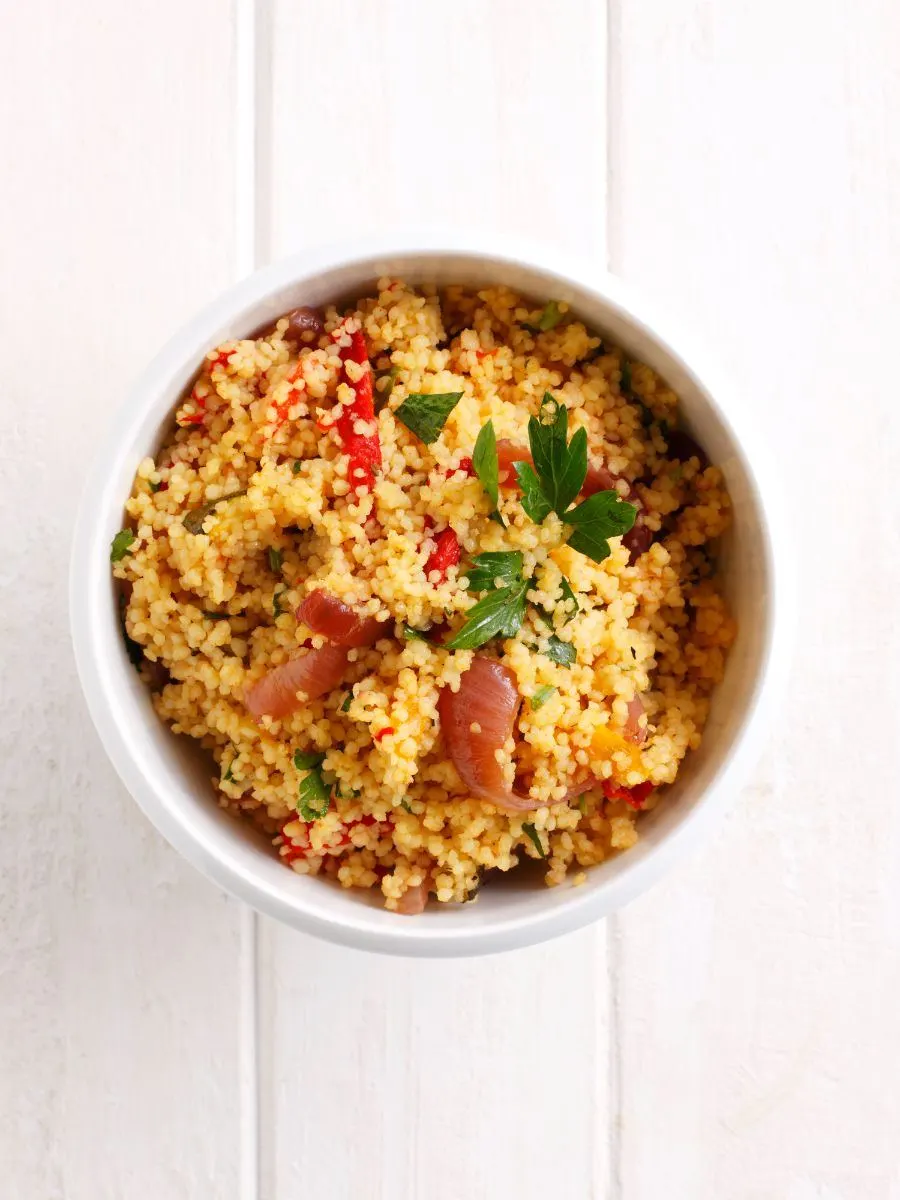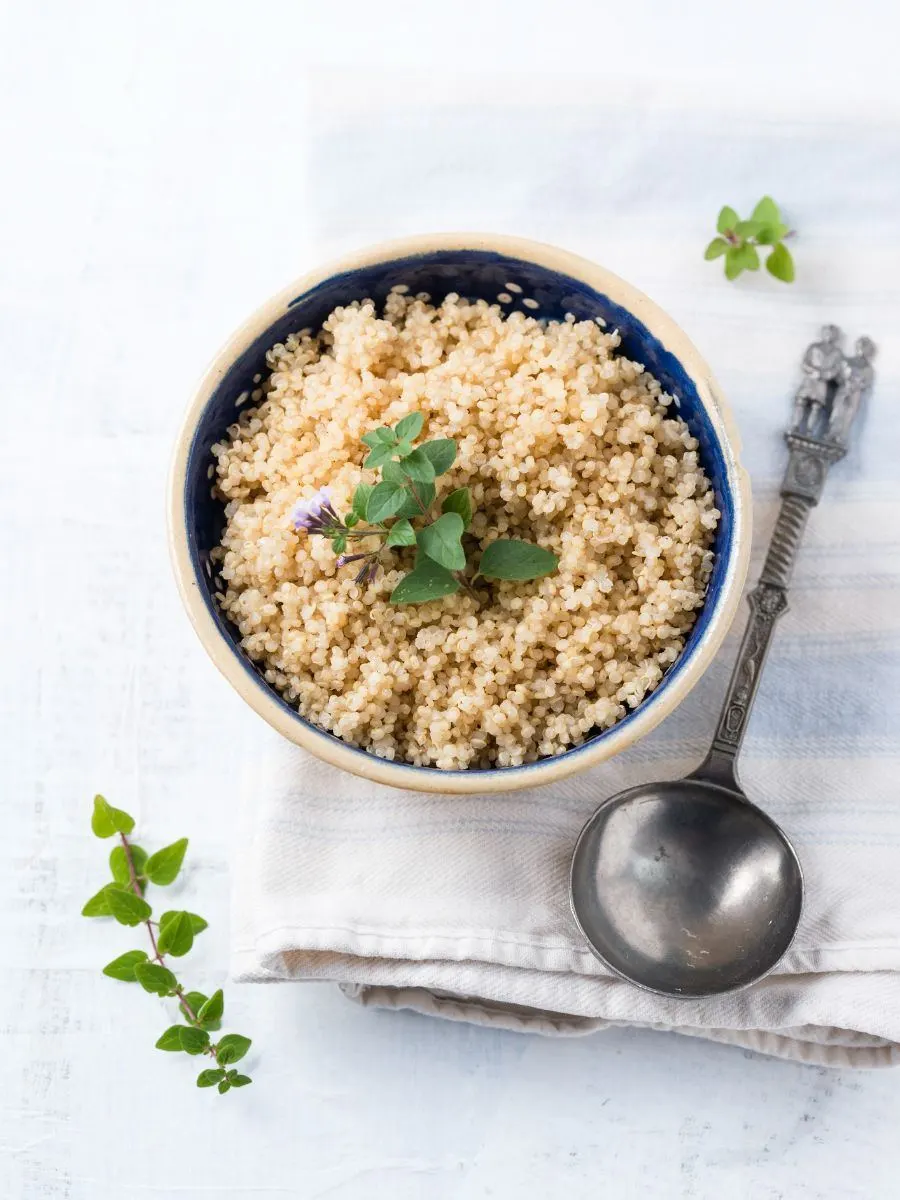Couscous vs Quinoa – differences
Introduction
While both couscous and quinoa offer win-win nutritional benefits (full of minerals, vitamins, and nutrients), which one has the nutritional edge? We dug in to find out.
Couscous
Couscous, also known as seksu or sikuk, is made from 2 different sizes of the husked and crushed semolina (coarse pale-yellow flour ground from hard durum wheat) using water to bind them.
It is the staple product of North Africa and the national dish of Morocco, Algeria, and Tunisia. Additionally, it is a celebratory dish eaten at weddings or at the end of Ramadan.
The basic ingredients of the couscous stew are legumes, seasonal vegetables, meat, and spices. Alternatively, it can be eaten as a sweet dish with fruits.
Quinoa
It is an Andean plant that originated in the area surrounding Lake Titicaca in Bolivia and Peru. The Inca considered it a sacred gift from the gods and called it the “mother grain.”
Quinoa is a member of the Amaranthaceae family but is not a true cereal. Due to this fact, it is known as a pseudocereal.
Nutrition Facts
100g of cooked couscous contains:

@Getty
- 112 calories;
- 23.2g Carbohydrate – 8% DV;
- 1.4g Fiber – 6% daily value;
- 3.8g Protein – 8% DV;
- 0.1mg Vitamin E – 1% DV;
- 0.1mcg Vitamin K – 0% DV;
- 0.1mg Thiamin – 4% DV;
- 1mg Niacin – 5% DV;
- 0.1mg Vitamin B6 – 3% DV;
- 15mcg Folate – 4% DV;
- 0.4mg Pantothenic Acid – 4% DV;
- 3.3mg Choline;
- 8mg Calcium – 1% DV;
- 0.4mg Iron – 2% DV;
- 8mg Magnesium – 2% DV;
- 22mg Phosphorus – 2% DV;
- 58mg Potassium – 2% DV;
- 0.3mg Zinc – 2% DV;
- 27.4mcg Selenium – 39% DV.
Quinoa
100g of cooked quinoa contains:

@Getty
- 120 calories;
- 21.3g Carbohydrate – 7% DV;
- 2.8g Fiber – 11% daily value;
- 4.4g Protein – 9% DV;
- 5 IU Vitamin A – 0% DV;
- 0.6 mg Vitamin E – 3% DV;
- 0.1mg Thiamin – 7% DV;
- 0.1mg Riboflavin – 6% DV;
- 0.4mg Niacin – 2% DV;
- 0.1mg Vitamin B6 – 6% DV;
- 42mcg Folate – 10% DV;
- 17mg Calcium – 2% DV;
- 1.5mg Iron – 8% DV;
- 64mg Magnesium – 16% DV;
- 152mg Phosphorus – 15% DV;
- 172mg Potassium – 5% DV;
- 1.1mg Zinc – 7% DV;
- 0.2mg Copper – 10% DV;
- 2.8mcg Selenium – 4% DV.
Health Benefits
Couscous
Reduces The Risk Of Cancer
It is an excellent source of selenium (100g provides 39% DV). A 2016 study done at the Institute of Environmental Medicine, Zhejiang University, China, established that high selenium blood levels protect against different types of cancer.
Note – this effect was linked with eating foods high in selenium, rather than taking supplements containing this mineral.
Selenium is also vital for women and men since it protects the sperm and eggs against chromosomal damage that can substantially increase the risk of birth defects and miscarriages.
Moreover, this mineral is needed for the healthy functioning of the immune system as it fends off infections and viruses by stimulating the activities of white blood cells.
Weight Loss
The fiber content of couscous acts as a deterrent to the secretion of the hormone that generates feelings of hunger, called ghrelin. A reduction in ghrelin reduces the chances of eating too much, hence, increasing your chance to lose unnecessary weight.
A regular diet rich in dietary fiber may also lower a person’s risk for diabetes mellitus (a condition that occurs when the body can’t maintain healthy levels of glucose in the blood) since it slows the absorption of sugars.
The good bacteria in the gut feed on dietary fiber. In time, this will lead to a higher amount of beneficial gut bacteria, which has been shown in clinical studies to reduce chronic inflammation in the body and boost immune function. Lastly, fiber helps clean out bad bacteria in your intestines, which may reduce the risk of colon cancer.
ALSO READ: CQ10 – Benefits
Quinoa
Gluten-Free
Gluten is found in grains, like – barley, wheat, rye, and triticale (a cross between rye and wheat). Quinoa is considered an ideal food for those prone to food allergies since it is gluten-free. A gluten-free diet is usually adopted by people with Celiac disease, a type of autoimmune disorder in which the human body attacks itself.
According to a 2009 study done at the Celiac Disease Center, Columbia University, New York, USA, eating quinoa instead of refined tapioca, rice flour, and corn (typical gluten-free ingredients) can substantially increase the antioxidant and nutrient value of the diet.
Complete Protein
Quinoa contains all the nine essential amino acids (isoleucine, leucine, histidine, methionine, lysine, phenylalanine, tryptophan, threonine, and valine) which the human body cannot produce on its own. Amino acids, the building blocks of proteins, are compounds which have numerous essential roles in your body.
For instance, amino acids help increase the rate at which the body can build proteins, therefore, you are not breaking down muscle faster than you can rebuild.
Good For Diabetics
Quinoa has a low-glycemic index and fat (1.9 grams per 100 grams) making it an ideal food for people with type 2 diabetes as well as any individual trying to stay away from high-glycemic carbohydrates.
Excellent Source Of Iron
Iron is an essential mineral that increases brain function due to the fact that the brain takes in approximately 20 percent of your blood oxygen.
Moreover, this mineral helps to transport oxygen from one cell to another since around 70% of your body’s iron reserves are found in the red blood cells red cells contain hemoglobin, and it is the hemoglobin (a type of protein) that allows them to carry oxygen.
ALSO READ: Swerve vs Truvia
Bone Health
Quinoa is high in magnesium (100g contains 16% DV), which is an essential mineral that works great for bone health. In fact, approximately 60 percent of the magnesium in your body is found in your bones.
Magnesium also disposes of lactic acid, which can build up in muscles during physical exercise and cause pain as well as it helps move blood glucose into your muscles.
Low levels of magnesium are associated with:
- migraines;
- osteoporosis;
- high blood pressure;
- diabetes;
- cardiovascular disease;
- muscle spasms.
Healthy Heart
Heart disease is the leading cause of death for both females and males. An estimated 600,000 people die of heart disease in the US every year.
This pseudocereal contains anti-inflammatory nutrients which make it an excellent addition to a heart-healthy diet. Also, it has no cholesterol or saturated fat.
ALSO READ: Ginkgo Biloba vs Ginseng – Differences
Side Effects
Couscous is a gluten-containing pasta, therefore anyone with a gluten sensitivity or celiac disease should steer clear.
Quinoa contains some ingredients that could cause gastrointestinal reactions. These ingredients also give quinoa a soapy or bitter taste. It is most likely due to substances called saponins – chemicals made by plants to thwart predators (insects, birds, and fungi) from eating them. The good news is that rinsing quinoa removes most of its saponin content.
Bottom Line – Couscous vs Quinoa
Couscous may look like a whole grain, but you must realize that technically it is a pasta. On the other hand, quinoa is a whole food with a substantially better nutritional profile and more health benefits.
Also, Quinoa takes about 15 minutes to cook, while couscous takes about 10 minutes to cook.
Sources https://www.researchgate.net/publication/267423813_Gluten https://www.hsph.harvard.edu/nutritionsource/food-features/quinoa/
